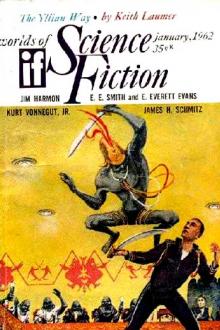Tracking Shot by Colin Campbell (i can read book club .txt) 📗
- Author: Colin Campbell
Book online «Tracking Shot by Colin Campbell (i can read book club .txt) 📗». Author Colin Campbell
McNulty raced toward the cop and jerked a thumb toward the fleeing man. “Call for backup.” Then he vaulted the railing too. When he’d done this stuff on the movie set he had weeks to arrange the stunts. Safety was paramount. Doing it for real was a whole different experience. He bounced off the roof of the panel van and slid down the windshield of the car parked next to it. When he hit tarmac it was with one shoulder and a forward roll. When he got up he was facing the wrong way.
The gunshot split the air. The report echoed along the river. A warning shot. The old cop was shocked and winded and still didn’t want to shoot anyone. He spoke into his shoulder mic, then turned to go back down the stairs. Whatever he’d said must have sounded urgent because sirens sounded almost immediately.
McNulty spun around and saw the burglar dashing along the riverside walk toward the Moody Street Bridge. The mill was still in the background. The river was still flowing across the weir. Pedestrians were still photographing the pleasure boat as it went into its sweeping turn. McNulty sprinted after the running man but he’d lost time and distance.
The sirens grew louder and seemed to be coming from everywhere. The old cop must have put out an officer-needs-assistance call. Everybody responds to a cop in trouble. The shiny red panel van pulled away from the back of the motel and headed for the exit. Blue lights flashed across the bridge.
The running man came out of the riverside walk next to the Margaritas Mexican Restaurant and Watering Hole. A Budweiser delivery truck blocked Moody Street to the right so he had to go left. Onto the bridge. McNulty reached the corner and followed him along the sidewalk. Photographers jumped out of the way. Flashing blue lights and sirens approached both ends of the bridge.
An air horn and ship’s bell sounded. The running man didn’t hesitate. He vaulted his second railing in as many minutes and disappeared over the side. McNulty raced to the spot and saw him land awkwardly on the upper deck. The leisure boat continued its turn, pulling away from the bridge back along the river.
McNulty weighed angles and distance and the tiredness in his legs. Did he have enough strength to jump the widening gap? Was it worth the potential injuries? Did he feel like Tom Cruise? The answer to all three was no. The man disappeared in the crowd as the boat pulled away. McNulty slammed his hands on the railing.
Cars screeched to a stop behind him. Blue lights flashed. The sirens stopped. Half a dozen cops aimed their guns across the roofs of their marked units. A plain Crown Vic pulled up beyond them and a detective got out. McNulty kept his hands on the railing so nobody would shoot him. Jon Harris came through the cordon and spoke to the back of McNulty’s head.
“Is this the part where you tell me what you did with the missing film?”
TWELVE
Police Headquarters. Again. At the same desk in the Detectives Bureau overlooking the same parking lot out back. McNulty hadn’t been fingerprinted and photographed. That was a good sign. Except you only get fingerprinted and photographed after you’ve been charged, so there was still plenty of time for that. He hadn’t been searched and read his rights, either. That was a better sign. You don’t get arrested and questioned without being searched and read your rights, so he wasn’t under arrest. Just helping police with their inquiries.
“Milk and sugar, right?”
Jon Harris waved an empty mug at McNulty. Cops don’t offer you coffee if they’ve got enough evidence to go at you hard. If the detective was taking the softly, softly approach then he must still be sounding McNulty out. He stirred milk and sugar into the coffee, then put it on the desk.
“Why don’t we start with what you’re not telling me?”
McNulty drank his coffee and kept it brief, if not entirely honest. He explained about finding out this morning that the handheld camera was missing and going to the first AC’s room to ask what had happened to it after the shooting.
“First A-C?”
McNulty realized the detective wasn’t up with movie terminology. “First assistant camera.”
Harris looked blank.
McNulty nodded. “Okay. D-o-P is the director of photography, the cinematographer. On a Larry Unger set he is also the main camera operator. First A-C operates the second camera, which in this case was the Arriflex.” He held his hands up as if looking through a viewfinder. “Reverse angle. Covering the rest of the room.”
Harris looked at the sketch McNulty had drawn yesterday. It wasn’t to scale but was a fairly accurate representation of the movie-set courtroom. The judge’s bench. The main doors. The static-camera position.
“Not this camera then?”
McNulty indicated an area off to one side. “Over here somewhere. Out of frame from the main camera.”
Harris traced a path to the door behind the judge’s bench. “And when the shooting started he took the camera out here?”
McNulty shook his head and pointed to a space beside the judge’s bench. “It was dropped here. I remember it being under the Stars and Stripes.”
Harris looked at the sketch plan. “So why didn’t you mark it down?”
McNulty ignored the implication. “I only marked the permanent fixtures. Best I could remember.”
Harris kept probing. “The bodies weren’t permanent.”
“They weren’t going anywhere.”
“Neither was the handheld camera.”
McNulty looked at the detective. “Apparently it did.”
Harris returned the stare. “Which brings us back to





Comments (0)